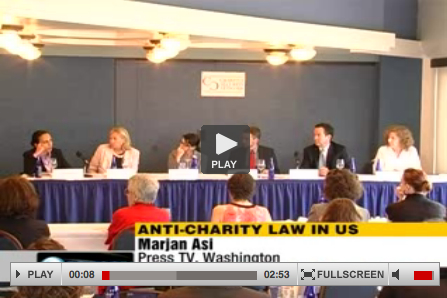On Tuesday, June 21, 2011 the Charity and Security Network sponsored a forum at the National Press Club featuring Ambassador Nancy E. Soderberg and a distinguished panel of U.S. nonprofit experts calling on the Obama Administration and Congress to remedy the negative effects of counterproductive security measures on peacebuilding activities and charities and donors.
The event, The Humanitarian Law Project Decision: Problems for Peacebuilding, Aid, and Free Speech One Year Later, focused on the overbroad application of the “material support” of terrorism laws that create restrictions on humanitarian aid delivery, First Amendment rights and criminalizes peacebuilding efforts aimed at turning terrorist groups away from violence.

At the event, Amb. Soderberg, President of The Connect U.S. Fund and former U.S. ambassador to the UN, released a letter from a bipartisan group of 18 organizations and 27 peacebuilding and foreign policy experts to Secretary of State Hillary Clinton asking her to use her exemption power to make conflict resolution and other peacebuilding activities legal. “There is a range of ways the U.S. government can respond…Without a correction, opportunities to end violence certainly will be lost. Multi-track diplomacy and peacebuilding do not pose a threat to our national security, in fact, they strengthen it,” Amb. Soderberg said.
Kay Guinane, the Director of the Charity and Security Network, released a statement signed by over 30 humanitarian, peacebuilding, and advocacy groups supporting reforms of security measures that restrict charitable and peacebuilding activities. “We would like U.S. law to be updated….to respect charitable access in order to provide basic humanitarian aid to civilians and to protect free speech, association and peacebuilding,” Guinane said.
Moderated by Naz Modirzadeh, the Associate Director of the Program on Humanitarian Policy and Conflict Research at Harvard University, the forum featured:
Nathan Stock, Assistant Director of the Conflict Resolution Program at the Carter Center, said: “The restrictions …constrain our ability to make effective foreign policy, especially in the Middle East. They make the job of our diplomats more difficult.”;
Joel R. Charny, Vice President of Humanitarian Policy and Practice at InterAction, said: “It is impossible to reconcile international humanitarian law with the Holder decision and with specific counter-terror measures like the Partner Vetting System.”; and
Emily Berman, Counsel for the Liberty & National Security Program at the Brennan Center for Justice, said: “There is a real risk that this decision will chill not just academic work and pure speech but political dissent within the United States.”
The entire event with all speakers and a Q & A session can be downloaded here.
One year ago, the Supreme Court decision in Holder v. Humanitarian Law Project upheld the law defining prohibited “material support” of terrorism to include conflict prevention and upheld the law defining prohibited “material support” of terrorism to include conflict prevention and resolution activities aimed at getting terrorist groups to lay down their arms. Under the “material support” law, American foundations, charitable groups and other NGOs are barred from distributing aid to at-risk civilians living or trapped in regions where designated terrorist groups operate if doing so is in any way “coordinated” with the designated group. This means that in conflict zones or natural disaster areas where designated terrorist groups are active, medical services or non-medicinal necessities such as clean water, tents, blankets, and food can be prohibited.
Podcast: Play in new window | Download


